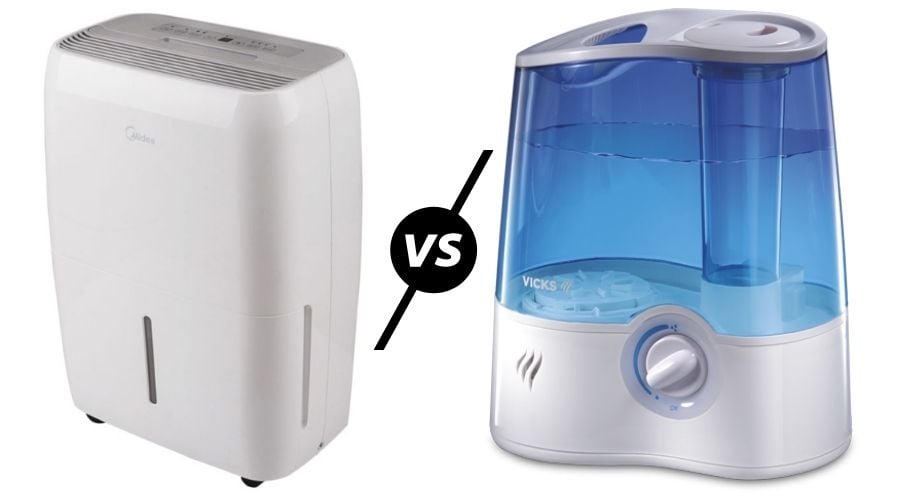
You may have heard a friend raving about how a humidifier cleared up her baby’s stuffy nose or how the mold problem in another friend’s home disappeared thanks to a dehumidifier.
But what are these miracle machines? And is there a difference between a humidifier and a dehumidifier?
We take a closer look and compare a dehumidifier vs a humidifier in this post!
What’s the Difference Between Dehumidifier and Humidifier?
Both of these electrical appliances can be used residentially, commercially, or industrially to help balance the amount of humidity present in the air.
Now here’s the big difference…
- Dehumidifiers remove moisture from the air if humidity levels are too high.
- Humidifiers add moisture to the air if it’s too dry.
The two main reasons people buy one or the other are because the dryness or humidity affects their health or damages their home.
We’ll go over the effects of humidity and dry air in more detail later.
But first, if you’re curious about what the air quality is like in your home, you can measure it using a hygrometer, which is a common tool available at most home improvement stores.
This is the best starting point for figuring out what could be causing you discomfort and the best device to help fix it.
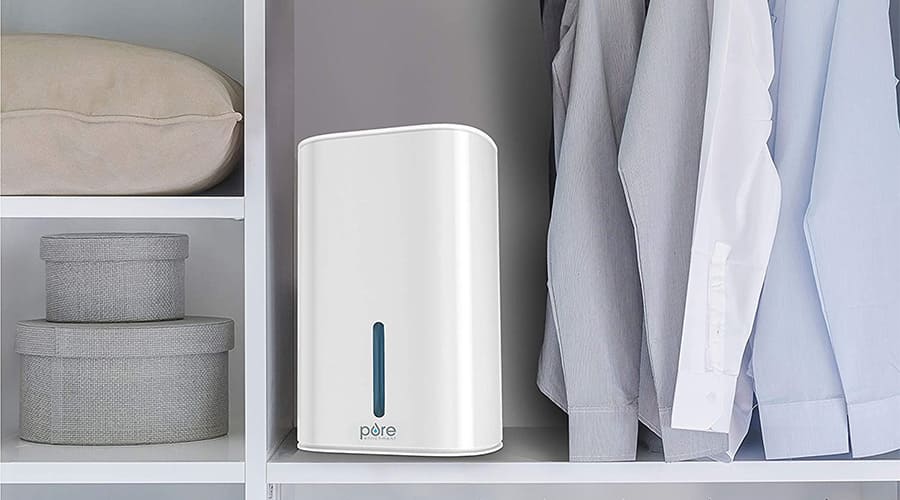
The 101 on Dehumidifiers
Did you use that hygrometer yet? If so, the humidity level in your home should read between 30% to 50%. If it’s higher than 50%, then you may want to consider buying a dehumidifier to balance things out.
How Dehumidifiers Work
Dehumidifiers work by using a fan to suck in warm air and pushing it through a set of coolant-filled coils. These coils “cool” the air, separating the water vapor and collecting it in a tank. The dry air is then pushed back out into the environment.
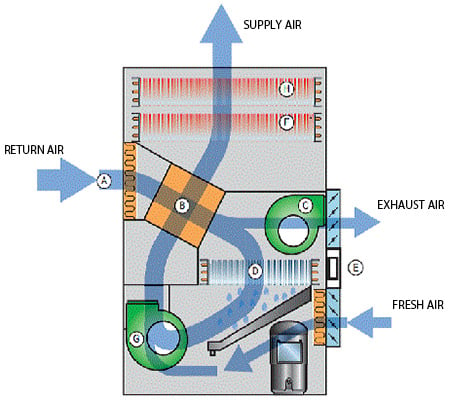
Dehumidifiers have a control panel that allows the user to set their desired humidity level. The dehumidifier will operate at that level to keep the humidity well-balanced.
Dehumidifier Benefits
There are several advantages and benefits of dehumidifiers. This includes:
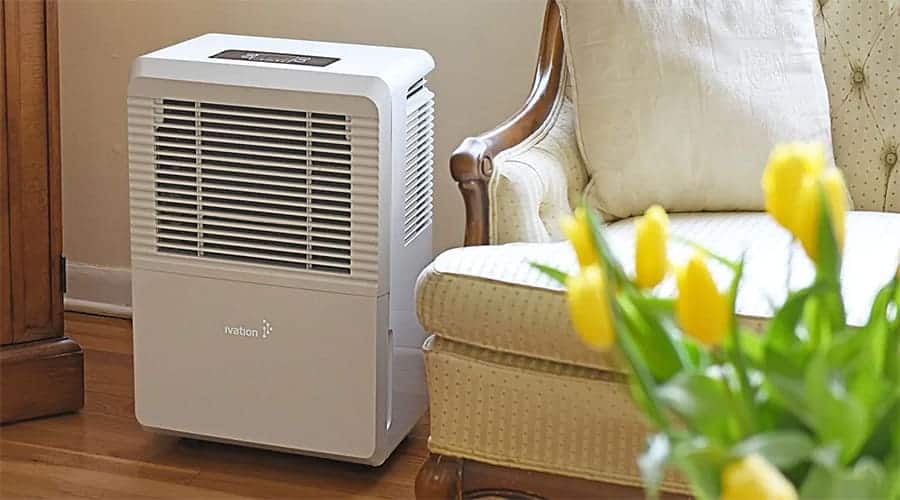
Dehumidifier Types
Whether you’re looking for a household dehumidifier or one for your business, they come in all shapes and sizes. There are also two main types to consider:
- Refrigerant dehumidifier: This is the type that cools the air using special coils, then pushes the air back into the room.
- Desiccant dehumidifier: This type of dehumidifier uses a wheel covered in an absorbent material to soak up the water vapor as the moist air is pushed through the rotating wheel.
Refrigerant is touted as being the most reliable dehumidifier, but it’s not recommended for colder temperatures and can break. That’s where the desiccant model comes in handy.
The best dehumidifier to buy for a single room or small space, such as a closet, is a portable dehumidifier.
But if you want the best quality dehumidifier, go for a whole-house model. This is built into your central air conditioning system and ensures your entire home is kept at a comfortable level.
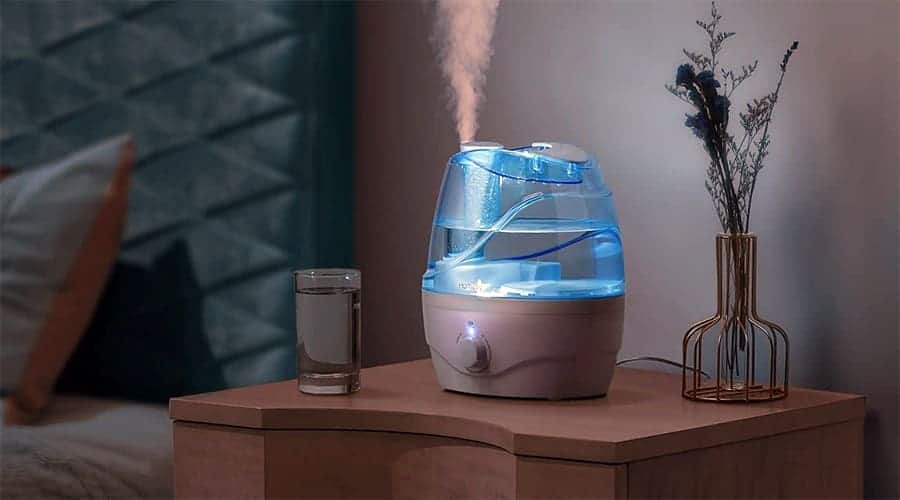
The 101 on Humidifiers
If humidity levels dip below 30% in your home, it may be time to shop around for a humidifier. Air that’s too dry can also affect health, typically during the cold winter months.
It’s important to remember not to let the air get too humid, or else you’ll be inviting roaches and mold into your home…yuck.
You also need to clean the humidifier regularly to prevent bacteria from flourishing and being released into the air.
How Humidifiers Work
Humidifiers also come in various sizes, all with different mechanisms that release moisture into the air and increase the humidity.
Generally, the device consists of a water tank and a vaporizer. Some types can sense the amount of moisture in the air and will automatically turn on and off when it’s adequate.
Humidifier Benefits
Dry air can also wreak havoc if it’s not balanced properly. A humidifier offers several benefits to enhance well-being, including:
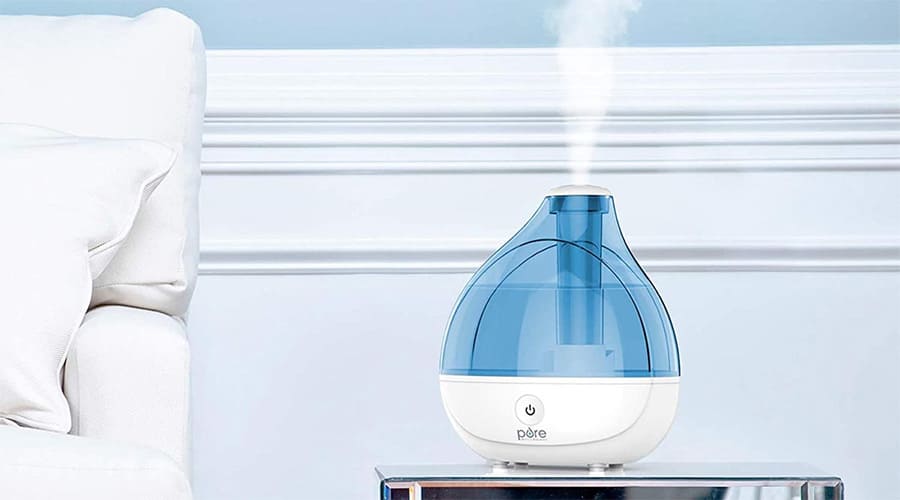
Humidifier Types
The idea behind a humidifier is quite simple, but a few mechanical processes make the magic happen. Here are some of the most popular types of humidifiers.
- Evaporative humidifier: This uses a fan to circulate dry air through a filter. The filter is kept damp thanks to a built-in water tank. The water evaporates through the filter, to add moisture to the dry air.
- Steam humidifier: This device boils water so that steam rises into the air.
- Ultrasonic humidifier: A metal diaphragm and a transducer are used to create high-frequency vibrations. A fine mist of water droplets forms at this frequency, and are released into the air.
- Impeller humidifier/cool mist humidifier: Water is drawn up from a tank by a rotating disc and pushed through a diffuser, which breaks the water down into tiny droplets to be released into the room.
Cool mist humidifiers are the most common and are safe for children and pets. You can even add essential oils to the diffuser for a lovely scented spritz.
Steam, though the simplest and most affordable type of humidifier, can also be dangerous for pets and children since it becomes extremely hot.
Ultrasonic humidifiers operate quietly and are also safe for children and pets to be around without the risk of getting burned.
Humidifier vs. Dehumidifier: Which One Should I Buy?
We’ve listed 4 different scenarios to compare when deciding between a humidifier vs dehumidifier.
Humidifier vs Dehumidifier vs Air Purifier
You now know the difference between a humidifier and a dehumidifier, but what’s an air purifier?
This device does not affect the amount of humidity in the air. Instead, it runs air through a multi-layered filter, stripping the air of pollutants and releasing the clean air back into the environment.
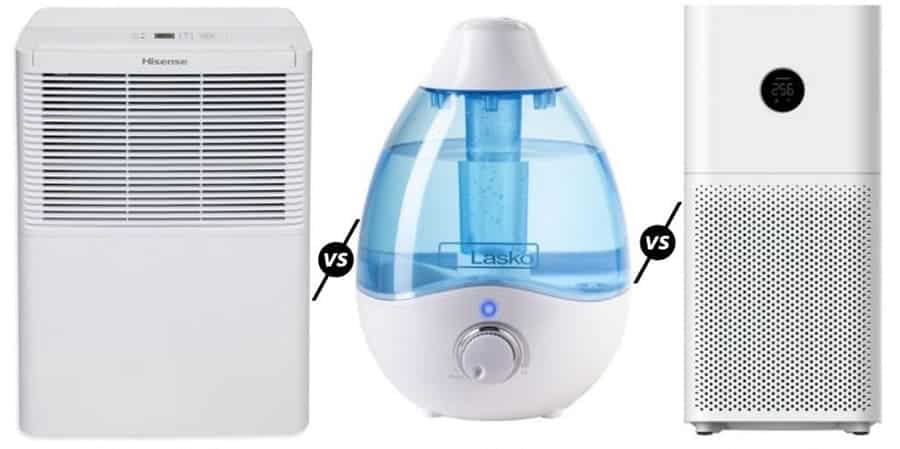
Remember…
☑ Dehumidifiers are effective if you live in a high-humid region during the spring and summer months.
☑ Humidifiers are effective if you live in a cold, dry region or experience dry winters.
👉 Air purifiers are effective for regions that experience heavy amounts of pollen or dander that irritates the lungs or for a home with cigarette smoke.
Humidifier vs Dehumidifier for Allergies
What is better for allergies, humidifier or dehumidifier?
Either one is beneficial for allergies, but it really depends on the region you live in. Use a hygrometer to establish the humidity level in your home, then choose the corresponding device to see if your allergies improve.
Humidifier vs Dehumidifier for Baby
Generally, a dehumidifier is not needed for a baby’s room unless you live in a home prone to mold or you don’t have air conditioning.
However, babies are more susceptible to dry nasal passages, irritated sinuses, and stuffy noses caused by dry air.
A humidifier is commonly recommended to soothe symptoms, but always check with your pediatrician first!
Humidifier vs Dehumidifier for Basement
Basements are notorious for having higher humidity levels due to the lack of ventilation. This is also why basements often smell musty, as mildew and mold may be present.
A dehumidifier is the best bet to help regulate the moisture in a basement and neutralize the odors.
Final Thoughts: Dehumidifier vs Humidifier
What is better, a humidifier or dehumidifier? Both devices serve a specific purpose to make an environment more comfortable.
A dehumidifier decreases the amount of humidity in an area, preventing allergens and easing symptoms for people who suffer from allergies or asthma.
A humidifier increases humidity in the air, soothing dry skin, nasal passages, eyes, lips, and other physical discomforts caused by dry air.
References & Resources:
- Difference Between Dehumidifier and Humidifier, DifferenceBetween.net.
- Health Benefits of Humidifiers and Dehumidifiers, WebMD.
- Looking For Allergy Relief? Your Humidifier or Dehumidifier Could Help!, AHAM.
- Signs You Might Need a Dehumidifier, The Spruce.
- Humidifier vs. Dehumidifier: Which is Better For Asthma?, ePainAssist.com.